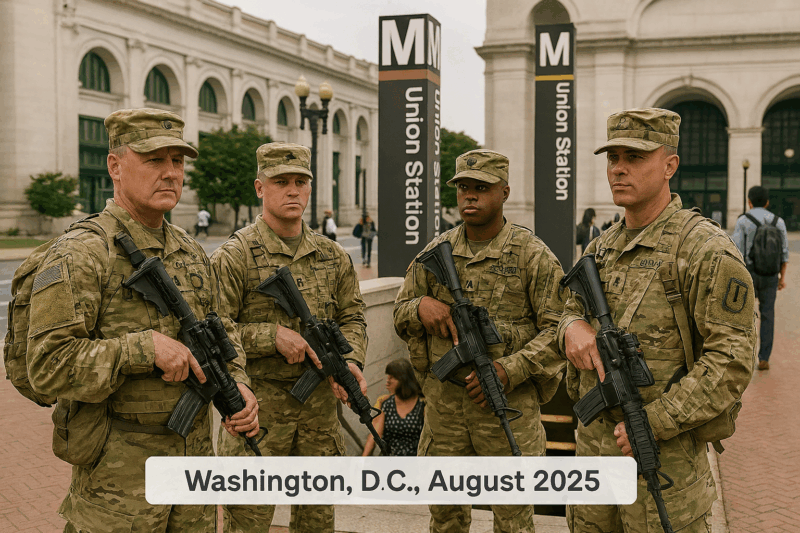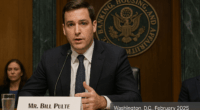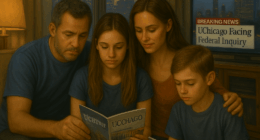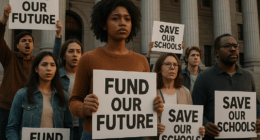Washington, D.C., public schools reopened amid heightened tension due to President Donald Trump’s deployment of over 2,000 National Guard troops and federal agents to the city. Some troops, newly armed under a directive from Defense Secretary Pete Hegseth, patrol metro stations and public spaces, prompting parental anxiety over safety and immigration enforcement. This blog explores the human impact, key details, legal context, and implications for D.C. and other cities like Chicago, where Trump has threatened similar action.
Human Toll
The presence of armed National Guard troops has left D.C. parents, particularly in immigrant communities, on edge. Mayor Muriel Bowser noted that many fear immigration checkpoints could lead to detentions, causing some to keep children home from school. This anxiety disrupts education for the city’s 52,000 public school students, with social media abuzz with rumors of arrests. Teachers and parents, like Alicia Swenson, report difficulty explaining the militarized presence to children, some of whom feel threatened. Community organizers, such as Migrant Solidarity Mutual Aid, are mobilizing safe passage programs to escort students, reflecting widespread distrust in federal intentions.
Community and Educational Impact
The deployment risks undermining the school year’s start, with parents like Itzetht Testa, a Trump voter and Air Force veteran, expressing regret over the policy due to its impact on her son. Teachers report the D.C. Public Schools (DCPS) system has offered little guidance, discouraging staff from sharing legal rights information, which heightens fears of educational disruption similar to COVID-era absences.
Key Facts About the Deployment
- Deployment Details: Trump invoked Section 740 of the D.C. Home Rule Act on August 11, 2025, deploying 800 D.C. National Guard troops, later expanded to over 2,000, including units from Ohio, South Carolina, and Tennessee. Troops are tasked with supporting law enforcement, removing homeless encampments, and picking up trash, with some armed as of August 24.
- Crime Claims vs. Data: Trump claims D.C. is a “killing field,” citing a carjacking incident involving a Department of Government Efficiency staffer. However, D.C.’s violent crime dropped 26% in 2025, with homicides down 12%, per Metropolitan Police Department data.
- Arrests and Operations: The White House reports over 1,000 arrests since August 7, including 86 on August 24, targeting undocumented immigrants and seizing firearms. ICE agents, no longer restricted by sensitive zones policies, operate near schools, raising concerns.
- Rules of Engagement: Armed troops operate under rules allowing force only as a last resort for imminent threats, but the lack of transparency about their roles fuels confusion.
Legal and Political Context
The D.C. Home Rule Act allows temporary federal control of the city’s police during emergencies, bypassing local authority, unlike in states where governors control the National Guard. The Posse Comitatus Act limits military involvement in civilian law enforcement, but D.C.’s federal status and Title 32 deployment status create a loophole. Legal challenges, similar to an ongoing California lawsuit over a Los Angeles deployment, are expected, with D.C. Attorney General Brian Schwalb exploring options. Critics, including Sen. Jack Reed, call the move a “brazen power grab,” while some residents, like Leroy Miles, support it for addressing property crimes like carjackings.
Chicago’s Response
Trump’s suggestion to deploy troops to Chicago, Baltimore, and New York has sparked fierce opposition. Illinois Governor JB Pritzker, speaking near Trump Tower on August 25, rejected the idea, citing a 31% drop in Chicago homicides and 36% decrease in shootings in 2025. Mayor Brandon Johnson called it unconstitutional, threatening legal action. Former Chicago Police Superintendent Garry McCarthy noted logistical challenges in Chicago’s sprawling layout, suggesting limited roles like perimeter patrols if coordinated with police.
Why This Matters
The deployment tests the boundaries of federal power in Democratic-led cities, risking escalation of community tensions and erosion of local autonomy. In D.C., where 92.5% voted against Trump in 2024, the move is seen as politically motivated, targeting immigrant communities and undermining progress in crime reduction. The fear of ICE presence near schools could lower attendance, impacting learning and mental health, as seen during past disruptions.
What Lies Ahead
The D.C. deployment is set to continue until at least September 25, 2025, unless Trump ends it sooner. Legal challenges may emerge, with Bowser and Schwalb vowing to protect residents’ rights. Community efforts, like volunteer-led safe passage programs, aim to mitigate fears, but sustained ICE presence could strain resources. In Chicago, Pritzker’s pledge to fight deployment suggests a potential showdown, with courts likely to decide the legality of federalizing state National Guards. Nationally, the precedent could embolden further interventions in cities like Baltimore, raising stakes for urban governance.
Conclusion
Trump’s National Guard deployment in Washington, D.C., has cast a shadow over the 2025 school reopening, with armed troops and ICE checkpoints fueling parental fears and community distrust. Despite claims of crime reduction, D.C.’s declining crime rates and Chicago’s resistance highlight the controversial nature of this federal overreach. As legal and community responses unfold, residents are urged to support safe passage initiatives and advocate for local control. Stay informed through reliable sources like the Associated Press for updates on this evolving situation.






